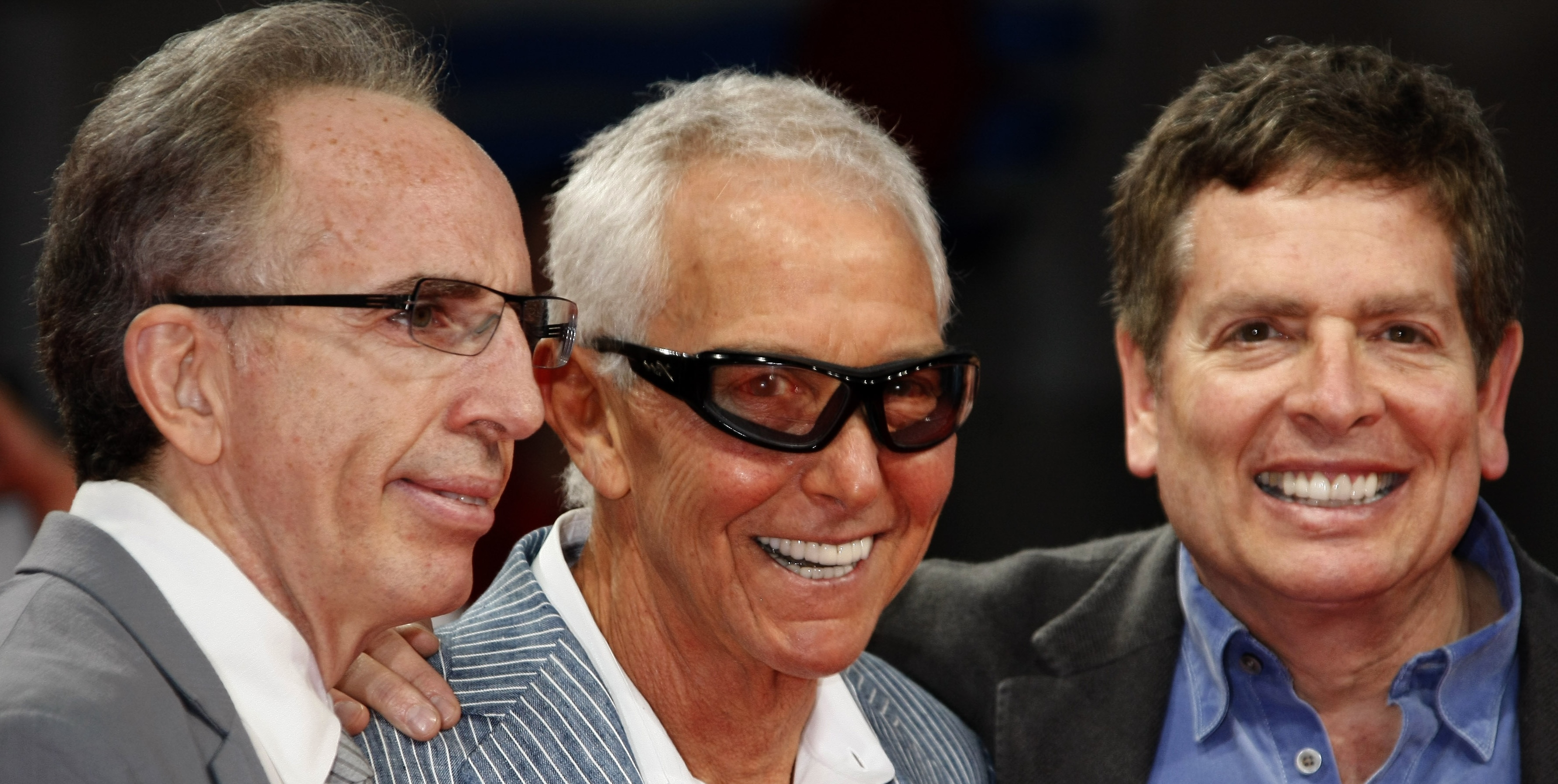Just before Thanksgiving, writer-director Jim Abrahams died at the age of 80. He was the A in ZAZ—the most prolific comedic team of the 1980s, the Zs being his school friends, the Zucker brothers, David and Jerry. The trio made their fame by spoofing pretty much every melodramatic Hollywood genre. They made a disaster movie, Airplane! (1980), and an espionage/Nazi war movie, Top Secret! (1984), but also detective movies, The Naked Gun! (1988) and its sequels, and Cold War action movies: Hot Shots! (1991) and its sequel.
All these movies are now primarily nostalgia viewing, somehow fit for the holiday season: something to share with friends and family. But in the 1980s, this was something like cinematic Reaganism—morning in America, a new comic dawn after more than a decade of incredibly grim stories made by incredibly talented artists like Coppola, Scorsese, and De Palma. Rather than committing suicide, America would laugh again.
The dark mood of that era was not restricted to cinema, of course—it was all over the news. But instead of the apocalyptic liberals of the ’80s, who preferred predictions of atomic warfare to an admission that their soft-on-crime, soft-on-communism ideology had failed, these comedies told people to relax. This new sense of fun was rather like Reagan’s calm, humorous demeanor, putting an end to a pretentious impotence and at the same time recovering an older, midcentury idea of normality.
Watching Leslie Nielsen playing the straight man in Airplane! is like watching Don Rickles at Reagan’s inauguration calling people hockey pucks. Rickles’ comic aggression baffled audiences as much by the absence of cursing as by its quaintness. So, too, in the ZAZ parodies: Nielsen’s humor seemed out of place, or even impossible, something as old-fashioned as Abbot and Costello routines—how could that humor come back and win over American audiences? Moreover, Abrahams insisted on reviving slapstick comedy and pratfalls, as well as the sight gags of silent comedy.
One reason for this comic success recalls Reagan’s own success: TV. Abrahams’ debut as a writer was the independent Kentucky Fried Movie (1977), a series of sketches in the format of local TV programming, recycling various genres from kung fu to exploitation as content. As the title points to fast food, so also the attitude of the spoof points away from beauty and toward enjoyment, and a certain knowing childishness. We are expected as an audience to recognize the genres and the conceits and to enjoy the successful imitation without the questionable enthusiasm for glamour.
Another detail about the change of comedy as the Baby Boomers became adults: John Landis directed the Kentucky Fried Movie, and then became the most successful comedy director of that time, with National Lampoon’s Animal House (1978), The Blues Brothers (1980), Trading Places (1983), Three Amigos (1986), and Coming to America(1988).
But Abrahams first major hit was Airplane!, which made more than $130 million worldwide in its initial release and gave ZAZ a career—the three friends shared credit for both writing and directing, a unique situation. After at least a decade of various kinds of disaster movies, audiences were ready for the mockery of this false seriousness; they were also, perhaps, less apprehensive about new technologies. The pretense that society could be understood through such dramatic metaphors as a ship or a plane or a skyscraper also came to seem a useless luxury, given social disintegration.
American character would, contrariwise, become more obvious in caricaturing these sanctimonious genres—and ZAZ took the caricature so seriously that they even hired Elmer Bernstein to write a score parodying pompous film music, which the old master enjoyed tremendously. In this lighthearted atmosphere, the freewheeling, confident, but also somewhat confused characters would be more themselves and likelier to come to a reasonably satisfying conclusion. A comedy of errors is simply a more realistic, more plausible way to self-knowledge than a fictitious facing of fears and acknowledging vulnerability in a crisis. It’s rather like the way friendly mockery is more helpful than psychotherapy, which is largely flattery.
But for my money, Top Secret! is the real achievement of ZAZ—again, the team shared writing and directing credit. The movie stars Val Kilmer, in his debut, as a rock singer going into East Germany fighting secret Nazis with American pop culture. Hard to find a better send up of liberal self-importance, entertainment or “soft power” as moralism. Top Secret! is a funny series of sketches spoofing behind-enemy-lines suspense and WWII nostalgia. You can see Omar Sharif suffering corny clown pranks while relaying intel. But there’s also remarkable comic invention—a scene filmed backward that nowadays looks like Lynch’s Red Lodge in Twin Peaks or something out of Nolan’s Inception, if not Tenet. Or a mockery of the drama of fight scenes where every movement is exaggerated because it takes place under water. Or a funny presentation of American exuberance and strength in a musical parody of the Beach Boys—Skeet Surfing. Nowadays, it recalls’ Stone and Parker’s Team America: World Police.
The Naked Gun: From the Files of Police Squad! adapted a short-lived TV show from 1982 for the big screen, and ZAZ reaped great rewards, more than $150 million. Leslie Nielsen’s implausible comic career reached its peak with his portrayal of Lt. Frank Drebin. In the opening scene, Drebin, on holiday, infiltrates a secret meeting of tyrants and kicks ass for America: Idi Amin, Muammar Gaddafi, Ayatollah Khomeini, Yasser Arafat, Fidel Castro, and Mikhail Gorbachev, not all of whom won the Nobel Peace Prize or received a flattering cinematic portrayal. Freedom!
The story, however, returns to Abrahams’ comical criticism of glamour and elite liberal self-importance. These tyrants are no threat to America, apparently, but only to Hollywood—and Drebin has to save the capital of global celebrity. The stories are hilarious, but there’s a difficulty—the third Naked Gun movie came out in 1994, when costar O J Simpson got away with murder. The 1990s were an unusual time; maybe there was just too much entertainment.
And it was in the 1990s that Abrahams parted with the Zuckers and made another very successful series of parodies—Hot Shots!, starring Charlie Sheen, who has also become a dubious figure since. Abrahams directed the movies and co-wrote them with Pat Proft, who co-wrote the Naked Gun movies. The first spoofs Top Gun, while featuring Saddam Hussein as a comical villain. The sequel parodies the Vietnam movies—the Rambo series, but also Apocalypse Now.
With the action movie, it seems the cinematic parody Abrahams specialized in ran out of options—no more heroes to mock. That makes sense especially for the 1990s, when no one covered himself in glory, and art became, we could say, postmodern. Unfortunately for us, society was still in the thrall of glamour and entertainment turned to celebrity worship. Abrahams couldn’t save us from that insipid stuff, but he did his best, and his comic courage still reassures audiences that normal Americans are preferable to the histrionic variety.

